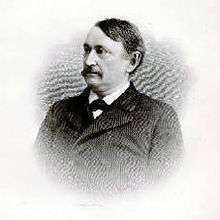Augustus Albert Hardenbergh
Augustus Albert Hardenbergh (May 18, 1830, New Brunswick, New Jersey – October 5, 1889, Jersey City, New Jersey) was an American Democratic Party politician who represented New Jersey's 7th congressional district in the United States House of Representatives from 1875 to 1879, and again from 1881 to 1883.
Augustus Albert Hardenbergh | |
|---|---|
 | |
| Member of the U.S. House of Representatives from New Jersey's 7th district | |
| In office March 4, 1881 – March 3, 1883 | |
| Preceded by | Lewis A. Brigham |
| Succeeded by | William McAdoo |
| In office March 4, 1875 – March 3, 1879 | |
| Preceded by | Isaac W. Scudder |
| Succeeded by | Lewis A. Brigham |
| Personal details | |
| Born | May 18, 1830 New Brunswick, New Jersey |
| Died | October 5, 1889 (aged 59) Jersey City, New Jersey |
| Political party | Democratic |
Biography
Hardenbergh was born in New Brunswick, New Jersey on May 18, 1830. He attended Rutgers College in 1844. He took up residence in Jersey City, New Jersey in 1846 and was employed in a banking house in New York City. He was a clerk in the Hudson County National Bank in 1852. He served as a member of the New Jersey General Assembly in 1853 and 1854. He was a member of the board of education in 1855 and 1856, and a member of the common council of Jersey City 1857-1863, serving as president in 1860. He moved to Bergen, New Jersey in 1863 and was a member of the city council of Bergen. He was elected State director of railroads in 1868, and moved to Demarest, New Jersey, that same year. He was a delegate to the 1872 Democratic National Convention. He moved to Jersey City in 1873 and was elected president of the Northern Railroad of New Jersey in 1874.
Hardenbergh was elected as a Democrat to the Forty-fourth and Forty-fifth Congresses, serving in office from March 4, 1875 – March 3, 1879, but declined to be a candidate for renomination in 1878. He was elected president of the Hudson County National Bank in 1878. He was elected to the Forty-seventh Congress, serving in office from March 4, 1881 – March 3, 1883, but was not a candidate for renomination in 1882.
Hardenbergh was one of the rare Democrats willing to buck his party's overwhelming support for the exclusion of Chinese laborers in 1882. He condemned the prejudice which was a key force in the push for Chinese exclusion, asking "Is freedom incompatible with any race . . . ?"[1] Hardenbergh was well aware of the stifling party pressure to support exclusion, but responded that "In the vindication of human rights I will know no party.[2]
After leaving Congress, he was appointed a member of the Jersey City Board of Finance and Taxation in 1883-1889, and was appointed by Governor Leon Abbett as a trustee of the State reform school in 1884. He died in Jersey City on October 5, 1889. He was interred in Mount Pleasant Cemetery in Newark, New Jersey.
Notes
![]()
References
- 13 Cong. Rec. Appendix 92
- 13 Cong. Rec. Appendix 93
External links
- United States Congress. "Augustus Albert Hardenbergh (id: H000183)". Biographical Directory of the United States Congress.
- Augustus Albert Hardenbergh at The Political Graveyard
- Augustus Albert Hardenbergh at Find a Grave
| U.S. House of Representatives | ||
|---|---|---|
| Preceded by Isaac W. Scudder |
Member of the U.S. House of Representatives from New Jersey's 7th congressional district March 4, 1875–March 3, 1879 |
Succeeded by Lewis A. Brigham |
| Preceded by Lewis A. Brigham |
Member of the U.S. House of Representatives from New Jersey's 7th congressional district March 4, 1881–March 3, 1883 |
Succeeded by William McAdoo |